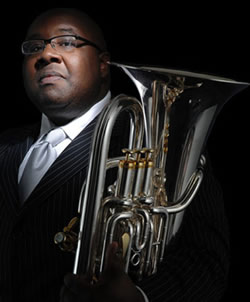Those of us invested and dedicated to the arts, in any form; know that our time is spent for the love of what we do. In this day and age, nobody can be in it for the money. It is organizations like the Triangle Brass Band whose contributions to the local arts-community maintain the integrity and high caliber musicianship that Raleigh has to offer. Comprised of volunteers – teachers, professors, lawyers, and more – these musicians dedicate significant hours of their already busy days to their instruments, honing their craft to excellence worthy of the great Meymandi Concert Hall, home of the North Carolina Symphony.
On March 22, when one might have presumed attendance at a NC Symphony brass band showcase, TBB Artistic Director Tony Granados pointed out the musical differences. The Triangle Brass Band performs as a British-style brass band; whereas orchestras or concert bands include trumpets and French horns, the British style brass band omits these instruments in favor of the cornet, flugelhorn, and tenor horn. The British style also utilizes both baritone horns and euphoniums, which may be used interchangeably in a concert band. Demonstrating the range of the euphonium during Saturday’s performance was special guest Demondrae Thurman. An award-winning brass musician, Thurman performs full time as first euphonium for the Sotto Voce Quartet, is Associate Professor of Music at Samford University, and serves on the faculty of multiple euphonium workshops. He shared his talents throughout the night with each Triangle Youth Band and merited an un-programmed euphonium piece with the Triangle Brass Band to share the breadth of his skills to their full potential with the grateful audience, members of which were on their feet at the culmination of his performance.
The evening began with the Triangle Youth Academy Brass Band under the baton of Matthew Edwards. Their program of Philip Sparke‘s “Music for a Festival,” Demondrae Thurman’s arrangement of “Deep River,” featuring Thurman on the euphonium, and James Curnow‘s Variations on “Terra Beata,” These also featured several young and talented soloists, all between 8th and 12th grade. The demonstration of talent and discipline justified the multiple honors the group has received from the North American Brass Band Association Youth Open Section.
Next on the program was the Triangle Youth Brass Band, which also touts multiple distinctions; the band has garnered first place honors with the North American Brass Band Association Championships in the Youth Division in 2001, 2002, 2004, 2006, 2007, ant 2009. Their challenging program, featuring “Purcell Variations,” by Kenneth Downie, “Ecco ridente in cielo,” the famous tenor aria from The Barber of Seville by Gioachino Rossini, and the finale from Symphony No. 4 by Pyotr Ilyich Tchaikovsky, explored quick-tempo scales, sudden stops, and unified sound.
After intermission, the Triangle Brass Band took the stage with the finale from Gustav Mahler’s Symphony No. 3. With Philip Sparke’s “Harlequin,” Demondrae Thurman shared his performances of the evening to a standing ovation from the audience. While the Band’s final programmed piece, The Phantom Menace Suite by John Williams, was potentially the most anticipated work of the evening, Peter Graham‘s “Xylophonia” proved to be the highlight of the evening’s performances. Featuring Campbell University professor Nate Campbell on the xylophone, the piece showcased the unique and remarkable talent of this musician with the refreshing and often overlooked sounds of the xylophone.
By raising the bar for brass music in the area, and most importantly by cultivating a new generation of passionate musicians, the Triangle Brass Band is providing a much needed service to the music in the greater Triangle. Check our calendar or the Band’s website for forthcoming programs.











